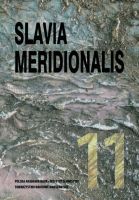„Chorwaci islamskiej wiary” – byt rzeczywisty czy twór propagandy?
The “Croats of Islamic faith” – reality or a creation of propaganda?
Author(s): Agnieszka GuckaSubject(s): History
Published by: Instytut Slawistyki Polskiej Akademii Nauk
Keywords: Croats; Croatia; Islam; World War II
Summary/Abstract: According to the latest census, in 2001, 56, 777 Muslims live in the Republic of Croatia. The present article is an attempt to answer the following questions about these “Croats of Islamic faith” (Hrvati islamske vjeroispovjesti): Who are they? Where do they come from? And how are they socially perceived? The notion that the Bosnian Muslims are “Croats of the purest blood” was first formulated in the first half of the XIX century by Dr. Ante Starčević, the founder of the Law Party and the originator of a modern Croatian national doctrine. His views were fully adopted and accepted by the Ustasha propaganda, which claims that Bosnia and Herzegovina is the historical cradle of the Croatian state. As a result of this, local Muslims enjoyed a status which was equal to that of the Catholic community. Some propaganda gestures of the time, such as a celebration of the opening of a big mosque in downtown Zagreb, were meant to make the Bosnian Muslims accept the idea of the NDH state and induce them to enroll in the Ustasha Army. After World War II numerous Muslims, who uncritically became advocates of the Ustasha propaganda also shared the fate of Pavelic and his followers. The other Muslims who left their country before the war cultivated the infamous traditions of the NDH state, as well as the myth of an apparent Catholic-Muslim brotherhood. Following the civil war (1991–1995) thousands of Muslim refugees from Bosnia and Herzegovina returned to Croatia, and the issue of their ethnic identity caused some problems. The level of social acceptance of the Muslim community in this traditionally Catholic community, however, is insufficient given the history, and displays of religious activity such as the establishment of Islamic schools and the building of mosques, raise anxiety and a fear of Islamicization amongst many Catholic Croatians. One can observe ongoing and endless Internet debates on the issue as to whether or not the Muslims living in Croatia are true Croatians, while politicians struggle to make use of the Muslim issue for their own purposes. In reality the “Croats of Islamic faith” are simply trying to adapt themselves to the global community and are too busy with everyday matters that they seem not to notice these debates that are largely theoretical.
Journal: Slavia Meridionalis
- Issue Year: 2011
- Issue No: 11
- Page Range: 15-35
- Page Count: 21
- Language: Polish

